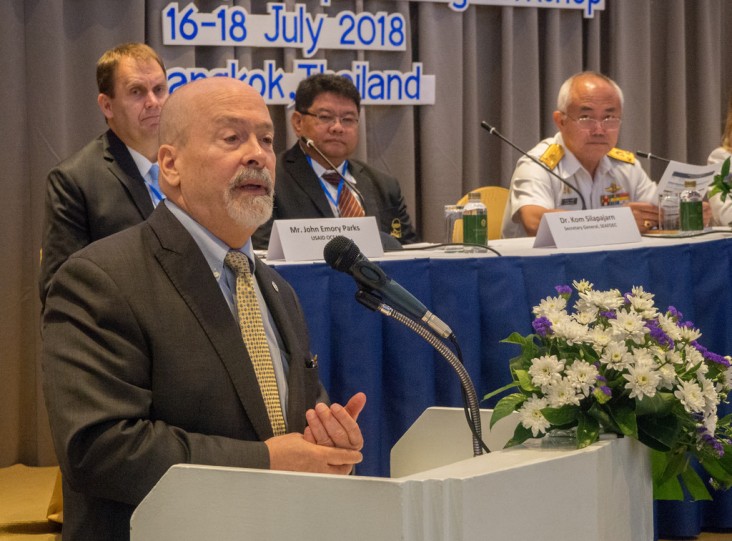Speeches Shim

Good morning everyone. Thank you all for being here, and foremost, a special thank you to the Southeast Asian Fisheries Development Center (SEAFDEC) for their outstanding collaboration and support in hosting this important event.
I would also like to welcome and thank the Coral Triangle Initiative on Coral Reefs, Fisheries, and Food Security, the Thailand Department of Fisheries, USAID Oceans’ Technical Working Group members and other partners for being here this week. Altogether, we have delegations from nine ASEAN member states with us.
The USAID Oceans and Fisheries Partnership was designed to promote transnational collaboration to address illegal, unregulated and unsustainable fishing. And it’s clear from the participation and commitment from everyone gathered here today that you have made that goal a reality.
You may have noticed as you settled into the room that there is a larger than usual group of new faces including partners from the U.S. Government, civil society organizations and private foundations.
In planning this year’s meeting, there was an outpouring of interest in the work that you all are doing to protect and revitalize Southeast Asia’s fisheries through enhanced digital traceability. This incredible technology that you will be discussing this week.
Combating illegal fishing and supporting sustainable fisheries remain priorities for the U.S. Government. We are committed to improving the ocean’s health, and in doing so, will foster an environment that enhances regional prosperity and strengthens food security. By building regional prosperity, we not only stand to improve the livelihoods of millions, but also build resilience and global stability that is beneficial to all. And in that regard, there is a common thread that binds this group together – you all understand, first-hand, the negative impact of unsustainable and illegal fishing practices – and you also realize the tremendous opportunity that you all have to create positive change here and now, working together.
The regional platform that has been developed through the technical working groups, SEAFDEC and the Coral Triangle Initiative has broadened the program’s reach, by placing emphasis on partnerships that connect governments and private sector actors – partnerships that have accelerated progress in realizing lasting change and solutions.
When we started three years ago, USAID Oceans had to actively seek partners. Now, we’re being approached frequently by private sector groups, including technology providers, startups and think tanks that want to know how they can support the program’s objectives.
The U.S. Government is particularly grateful to be able to connect with change makers who can push our collective work forward and create a marketplace for low-cost, innovative, and accessible technology that can contribute to a truly sustainable regional fishing industry.
As you start this workshop, I want to congratulate SEAFDEC and the nine country delegations here this week for their efforts and clear progress towards improved traceability and fisheries reform. Your contributions to this Partnership underscore your commitment to working together to find solutions to the complex regional challenges facing the Southeast Asia fishing industry.
We look forward to the following days and are grateful to have each of you here to continue strengthening this regional partnership.

Comment
Make a general inquiry or suggest an improvement.